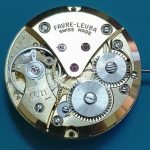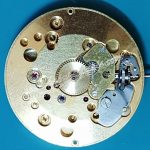Favre Leuba Brand | History
1718: Abraham Favre (1702–1790), who laid the foundation for the brand Favre-Leuba, began his watchmaker apprenticeship.
1737: On March 13, 1737, in an official document, Abraham Favre was first mentioned as an independent watchmaker in Le Locle.
1749: Around 1749, Abraham Favre was appointed Maître horloger du Locle (master watchmaker of Le Locle).
1792: On October 1, Abraham Favre (1740–1823), the company founder’s son, together with his sons Frédéric and Henry-Louis, founded the company A. Favre & Fils.
1815: Henry Auguste (1796–1865), Frédéric Favre’s son and thereby the fourth generation of the watchmaker family, joined forces with Auguste Leuba from Buttes in Val-de-Travers.
1820: Henry-August Favre traveled around the world – from Germany to Russia, through Cuba to New York, from Brazil to Chile – to establish their own workshop’s finely-made pocket watches in remote markets.
1851: Favre-Leuba pocket watches received numerous awards at national and international exhibitions – in London (1851), New York (1853), Paris (1855), Bern (1857), and Porto (1865), among others.
1855: Fritz Favre (1828–1877) proved himself to be a worthy successor to his father and successfully pursued his expansion strategy in Europe, America, and Asia.
1865: In 1865 and 1867, Fritz Favre traveled to India and launched his brand on the subcontinent, which was to quickly develop into an important market for Favre-Leuba.
1896: The company headquarters were relocated from Le Locle to Geneva.
1908: Henri Favre-Leuba (1865–1961) assumed leadership of the family business in 1908 and continued to steadily grow the brand. He remained president of the board of directors until his death in 1961.
1925: Favre-Leuba launched the first monopusher chronographs, just when wristwatches started to supersede pocket watches.
1945: After the Second World War, Favre-Leuba was able to count on a stable position in India thanks to their own office in Bombay. Step by step, the family company won back its position and relevance in other watch markets – first in Switzerland, then in Europe, and later in America and Africa. Branches in, among others, Hamburg, London, Rangoon, Karachi, Singapore, and New York secured well-functioning distribution as well as first-class customer service.
1946: After 1946, Favre-Leuba regularly exhibited at the Basel Watch Show, and, after 1953, at the Salon Montres et Bijoux (trade show for watches and jewelry) in Geneva as well.
1948: Favre-Leuba assembled precision watches such as chronometers, the outstanding accuracy of which was awarded with multiple first prizes by the observatory of the canton of Neuchâtel.
1955: Favre-Leuba introduced the manufacture caliber FL101, which was used in the Sea Chief, Sea King, and Sea Raider watch models.
1957: The brand introduced the FL102 caliber with calendar used in its Datic models. It was followed by the automatic movements FL103 and FL104, which were equipped without or with a calendar display.
1960: The very first divers watch, Water Deep, was introduced by the brand. It was the stepping stone for the success it garnered in this category.
1962: BIVOUAC: Favre-Leuba developed the legendary Bivouac, the world’s first mechanical wristwatch with aneroid barometer, for altimetry and air pressure measurement. It soon ranked among the indispensable equipment of those who overcame seemingly defined limits. The Bivouac completed one of its first missions on the wrists of the Swiss national parachuting team during the 1962 World Cup in the United States. The Italian mountaineer Walter Bonatti wore a Bivouac in 1964 when he and the Genevan Michel Vaucher successfully ascended the north face of Pointe Whymper (4,196 m) in the Grandes Jorasses for the first time and when he conquered the north face of the Matterhorn on the most direct route. The young Valais native Michel Darbelley undertook his first solo ascent of the Eiger in 1963 with his watch from the workshops of Favre-Leuba, which reliably showed him what altitude he had already scaled and whether a change in weather was imminent. The famous French polar explorer Paul-Emile Victor relied on his Bivouac on numerous expeditions to the endless ice.
FL251 CALIBER: The patented FL251 caliber of 1962, with 11.5‴ and a height of only 2.95 mm, revolutionized thanks to the use of two barrels, series production of extra flat movements with centered second hand.
1963:DEEP BLUE: Three years after the presentation of the first diver’s watch from the in-house atelier, the brand launched the Deep Blue, waterproof up to 200 m.
NEW HEADQUARTERS: Favre-Leuba reincorporated production of their own ébauches in the newly established company headquartered in Petit-Lancy near Geneva. The company was consequently named, as at the end of the 19th century, Manufacture d’Horlogerie Favre-Leuba S.A.
1967: The Fédération Horlogère Suisse (Federation of the Swiss Watch Industry) awarded first place to Favre-Leuba in the Chronographs and Sport Watches category at the World’s Fair in Montréal.
1968:BATHY: In 1968, the brand introduced the Bathy – the world’s first mechanical wristwatch that not only displayed dive time, but also current diving depth.
TWIN POWER: Favre-Leuba added automatic winding to its groundbreaking double-barrel calibers – making it one of the first brands to use this combination in series production. The new movements were available with or without a calendar function.
1970: Several models marked the transition into the 1970s, perfectly matching the fashion of the time with their distinctive pillowy design. Inside the Sea Raider with day and calendar indication ticked the automatic caliber FL1164 with 36,000 a/h, while the Memo Raider delighted the global clientele with an automatic alarm.
The Sea Sky and Sea Sky GMT models, which were introduced at the same time, combine the functionality of a diver’s watch with that of a chronograph and a 24-hour hand.
1985: The introduction of cheap quartz movements plunged the Swiss watch industry into a serious crisis that did not stop at the gates of Favre-Leuba’s workshops. The family was subsequently compelled to sell the brand in the 1980s. After that, the company changed ownership multiple times.
2011: On November 16, 2011, the Tata Group acquired the traditional brand Favre-Leuba and transferred its company headquarters to Zug.
2012: After extensive research into the history of Favre-Leuba and its legendary timepieces, the new team begins to develop a sustainable and long-term strategy that builds on the strength of Favre-Leuba and ties in with the brand values carefully nurtured over decades. The result is a collection of highly functional watches based on Favre-Leuba’s technical and aesthetic achievements, brought up to date with proprietary technologies and a strong, confident design, as well as a contemporary, innovative market presence.
2016: Favre-Leuba launches its ultimate diving watch, the Raider Harpoon, which features a unique way of reading the time. With its innovative functionality and by simplifying the complexity, it fits perfectly into a long line of legendary timepieces this watch brand has always designed.
2017:280TH ANNIVERSARY: 280th year anniversary celebrated at Baselworld with the launch of the Bivouac 9000, the ultimate instrument for all altitudes.
BRAND AMBASSADORS: The brand supports many athletes and expeditions, that express the brand claim of Conquering Frontiers. Pen Hadow, who led a mission to the Arctic, Satyarup Siddhanta, who embarked on a journey to the Mt. Vinson Massif, and Sayuri Kinoshita, who undertook a world-record dive, are some of the ambassadors representing Favre-Leuba and their tool watches.
2018:AWARD WINNER: Within less than a year of its launch, the Raider Bivouac 9000 wins the Watchstars award in the category New Stars for being the best new watch.
50TH ANNIVERSARY OF THE BATHY: Favre-Leuba celebrates the 50th anniversary of the 1968 superstar Bathy with the Raider Bathy 120 MemoDepth, which measures and records depth to 120 m.
BIVOUAC 9000 SUMMITS EVEREST: A great year for Favre-Leuba as its pioneering instrument watch, the Raider Bivouac 9000, reaches the summit of Mt. Everest. The Bivouac 9000 is the only mechanical altimeter watch in the world to have successfully reached the altitude of 8,848m
You can confirm the order by making a PayPal payment. My account email address is [email protected]
Watch Movement Enquiry
* If you are unable to fill out any of the required information fields, please type “N/A”.
Stem, Crown, Hands & Spares might be available for this movement.
Email us for rate and availability: [email protected]
Mobile/WhatsApp: +91- 9841 360 340
https://watchsparesparts.com/watch-parts-branded/favre-leuba-calibre-movement-and-spares/
Source : https://favre-leuba.com/about-us/history




You must be logged in to post a comment.